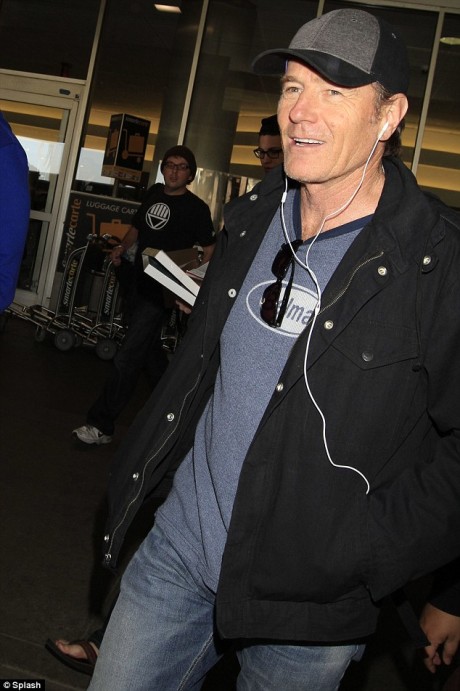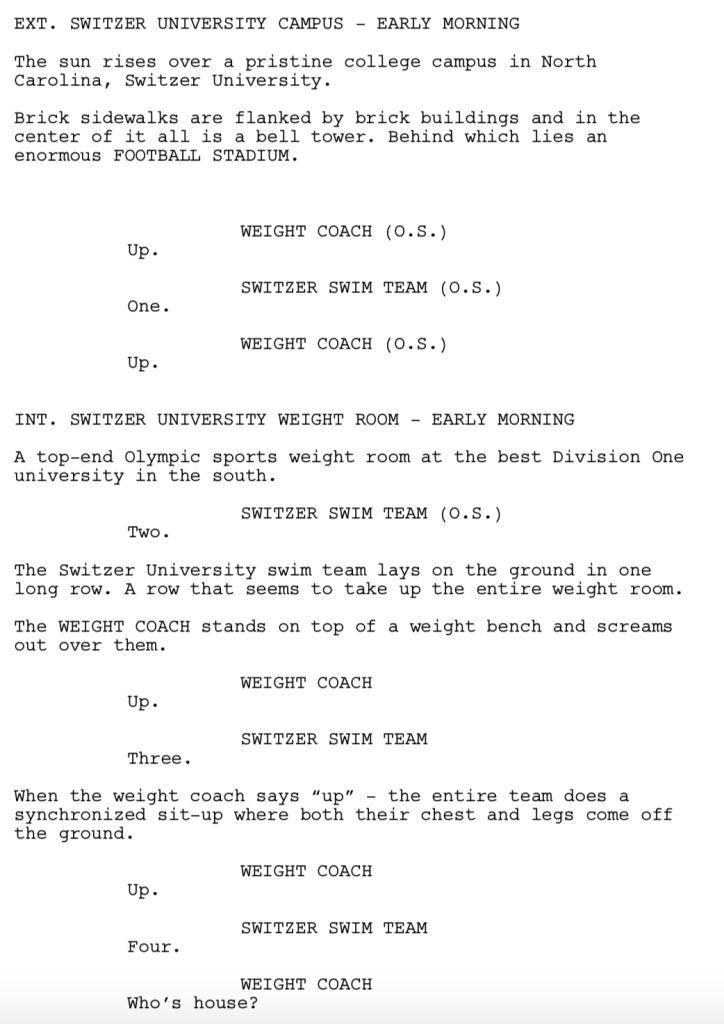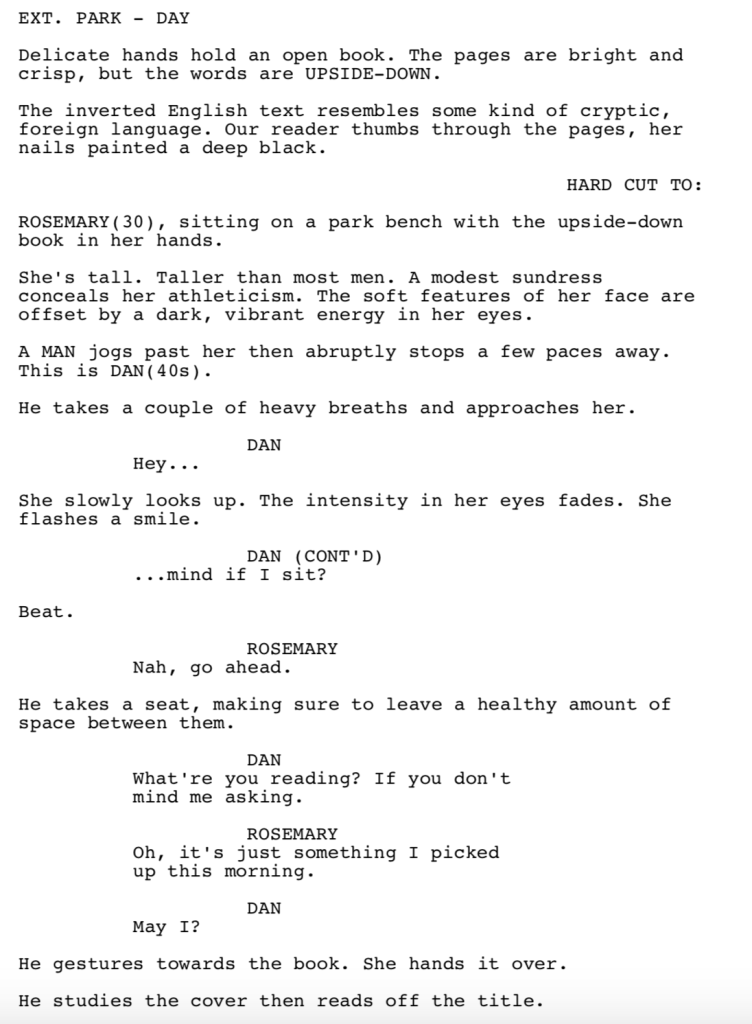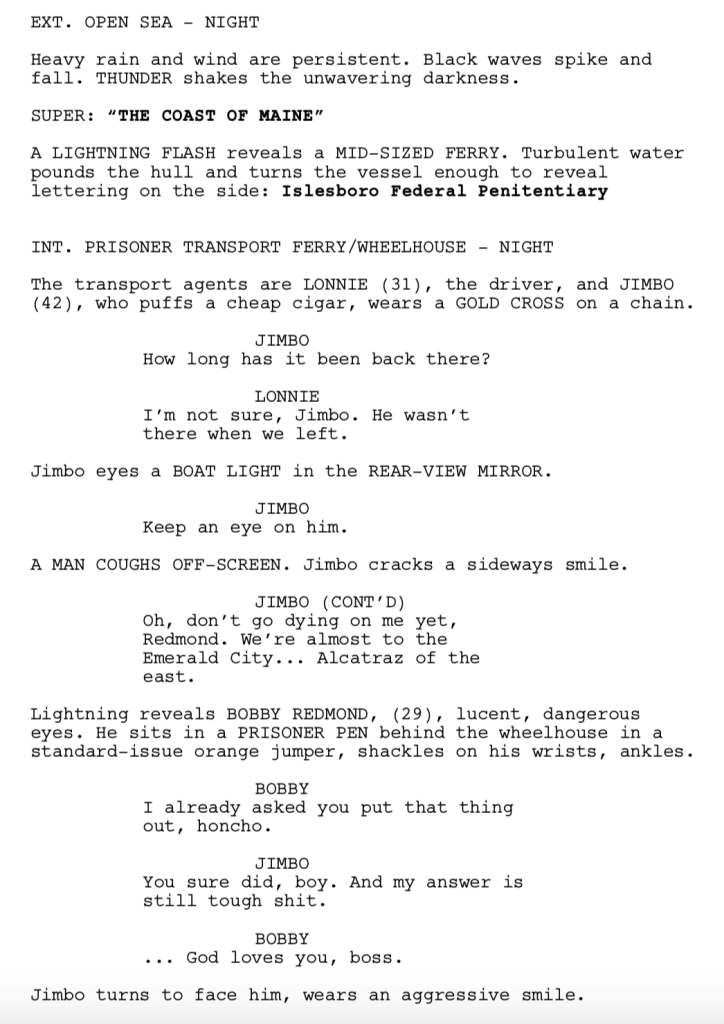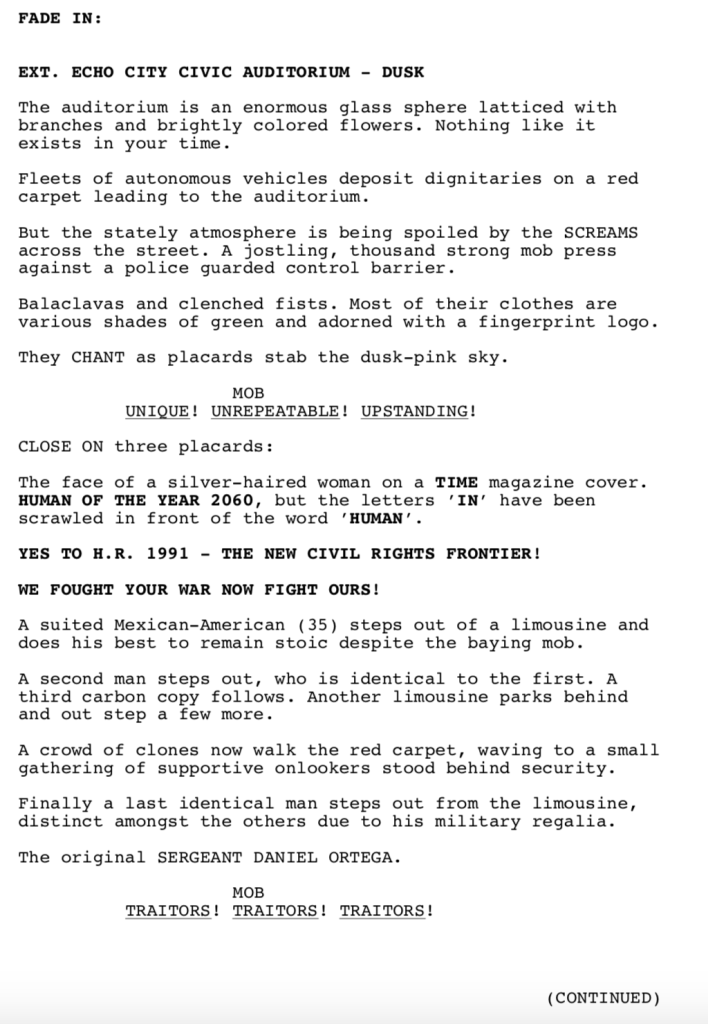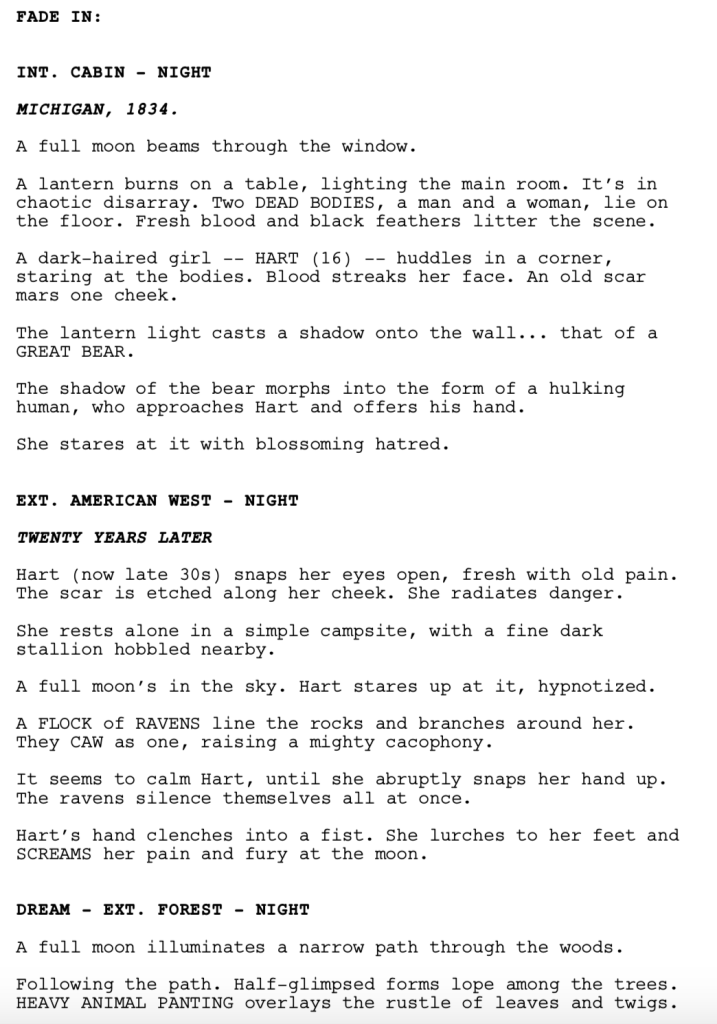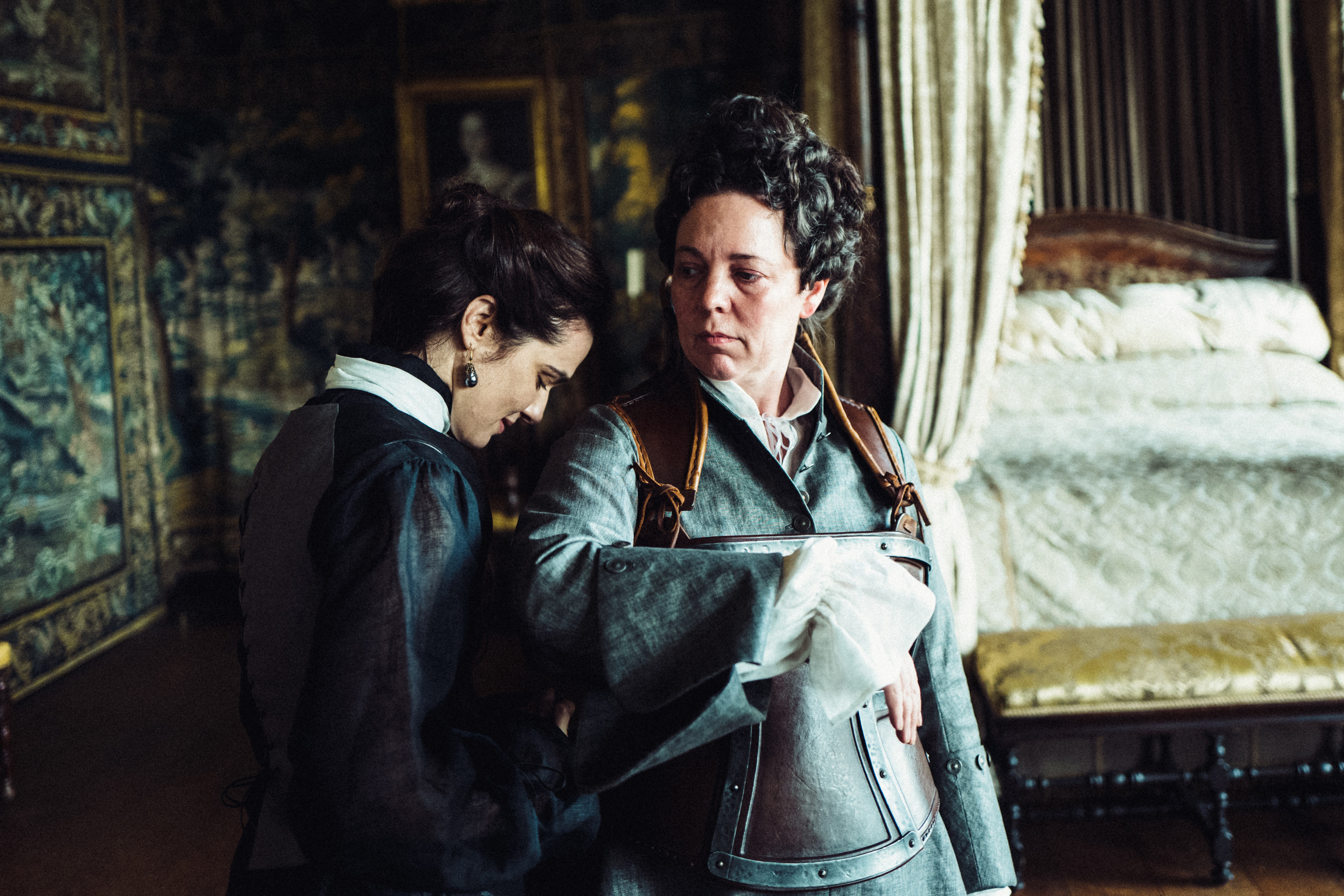Genre: Drama with light comedic elements?
Premise: After their friends lose their daughter to a drunk driving accident, a neurotic New York couple find themselves unable to comfort and relate to their pain. But as the pair grapples with their personal inadequacies, their own relationship slowly begins to unravel.
About: Today’s script finished on both The Black List (top 20) and The Hit List (Top 10). The writer, Greg Kalleres, used to write commercials for high profile clients such as ESPN, Nike, Budweiser, Twitter, and Google. He has since segued into playwriting, and now, screenwriting. One of his more recent plays, Honky, is about how a sneaker blows up with young white buyers after a black man is murdered for the sneakers. You can read an interview with Kalleres about the play here.
Writer: Greg Kalleres
Details: 105 pages
It’s always interesting reading screenplays from playwrights because all of the emphasis is on the dialogue. Plays don’t work like cinema does, which is about showing (not telling). With plays, silence is death. Therefore, if actors aren’t talking a lot, something’s wrong. For that reason, it’s more important for playwrights to learn how to write good dialogue. And indeed, the dialogue in Our Condolences is the highlight.
Where playwrights get into trouble is with scope. They’re used to having one location, one stage. And while there are clever ways to switch locations, you’re basically spending long periods of time in the same place. You always see that when playwrights take on features. The stories are limited in scope.
Our Condolences introduces us to a proud liberal easy-going New York couple, James and Liz. James is a movie reviewer who trashes most movies even though he secretly likes them. And Liz works for a giant advertising company.
They’re headed over to Mike (a former SEAL who cashed in on his job by becoming an author) and Christina’s house, who they haven’t spoken to since they lost their young daughter when their car was hit by a drunk driver. On the subway, the two joke around about what it is they’re supposed to say in these situations. “I think maybe we do it right away. You know, just nip it in the bud,” James says. Liz, sarcastic, replies, “So, what, we walk in and immediately say: ”Hi guys, we can’t possibly know what you’re going through?!”” “I thought that was my line.” “Why are you being all Woody Allen about this?”
However, the mood changes when they get there. Mike opens the door, screaming that Christina is in the bathroom, threatening to kill herself. The three race to the bathroom and Liz unloads a line of bullshit about fighting for your life that sounds good in the moment, stopping Christina from going through with it. When they get home later that night, Liz is a wreck. She begins questioning everything – their relationship, their stupid jobs, their purpose on earth. Basically, she feels guilty for not experiencing the pain that Mike and Christina feel.
The next day, Liz goes back to see if everything’s okay but only Mike is there. After talking for awhile, Mike kisses her. Liz is confused but sort of goes with it. Mike makes a play on her, asking if she’s happy with a silly man whose contribution to society is ripping on movies all day. She doesn’t exactly disagree with this assessment.
Meanwhile, James randomly runs into Christina at the movies. After this happens a few more times, he learns that Christina is following the drunk driver who killed her daughter. When it becomes clear that it’s only a matter of time before Christina cracks and kills him, James will have to figure out how to stop her. And he may have to do it without a wife, since every day that goes by, Liz is less and less clear on why she married him.
Our Condolences starts off awesome. Passed my First 10 Pages test with ease.
I love movies that tackle serious subject matter in a humorous way. You’ve got to find the right tone, which is difficult. But if you can pull it off, the movie feels unlike anything else out there. It’s what creates that elusive “fresh voice” that Hollywood keeps asking for but can never define.
To give us a comedic take on a dead child is a brave move. And when you can combine that with easy-breezy dialogue that makes your eyes fly down the page, I was in screenplay heaven for the first 10 pages.
But then the writer began making strange choices. We go from fun and giddy to super serious and sad. Mike is a huge downer and Christina isn’t far behind. Not that I expected them to be happy, obviously. But the tone was set up to be funny. So I didn’t know why we all of a sudden dialed it up to 11 and became suicide central.
I eventually got used to the new tone. But then the characters are given these overtly goofy jobs that implied we were back in comedy land. Mike is a former SEAL who wrote a book that became a best seller for alpha men. Liz was working on an advertising job that revolved around building an 80 foot tall potato chip. James goes and sees silly big-budget movies that he trashes… then goes and sees them again cause he likes them.
At a certain point, I couldn’t lock down what the tone of this movie was! And if I don’t know what universe I’m in, it’s hard to enjoy what I’m watching. In fact, if you were to ask me, “What movie is this most similar to?” I couldn’t give you an answer. And that’s a big deal. Producers and studios are looking for any reason to say No. And if you can’t give them a comparable successful movie, it’s a No before you’ve walked in the door.
To be honest, I think the character jobs are what sunk this script. They feel like made-up movie jobs. These are jobs that are common in La La Land. But in the real world, nobody knows anybody who does this stuff. And the reason that’s important is because you’re writing a movie about real people and real emotions and grief. And if the people involved are doing Three Stooges routines while pitching the merits of an 80 foot tall potato chip in Times Square, it’s hard to take them seriously.
Actually, one of the easiest ways for me to identify newbie screenwriters is made-up movie jobs. Unless these jobs are organic to the characters to the point where nobody is going to question them, you want to use real jobs. The large majority of people have boring real jobs.
Despite that, the dialogue here is strong. There’s a naturalism to the interactions, a nice flow. If I learned any new dialogue tricks, it would be that dialogue works best when you’re playing against the emotion. The best scene in this movie is the first one. That’s because the characters are going to someone’s house who lost a child, yet their dialogue is light and playful and fun. Later on, when the dialogue lines up with the emotion, it’s more on the nose, and therefore not as interesting.
And that would be my big suggestion here. This script should’ve stayed with the tone it started with. Once it got serious, it lost a step.
[ ] What the hell did I just read?
[x] wasn’t for me
[ ] worth the read
[ ] impressive
[ ] genius
What I learned: After James and Liz jokingly fight each other in that opening scene, we get this line of description: “Suddenly they both begin laughing like idiots. This is the essence of them. This moment. And we can’t help but like it.” Don’t ever write this line! Never! You should never ever tell the reader what to feel. Readers read more stuff than you can imagine. And the one thing they’re never receptive to is being told what to feel or think. Let your writing do that.
Genre: Article/True Story
Premise: After having a stroke, a prominent Los Angeles doctor begins rapping, eventually taking his talents to the heart of the Los Angeles street rap scene.
About: This Atlantic article was discovered and picked up by producer Michael Sugar (Spotlight). Sugar will produce the film for Netflix. John Hamburg (I Love You, Man and Why Him), will adapt and direct the film. Jeff Maysh, who likes to write articles that have the potential to become movies, wrote the article. Here’s another of his articles about a unique catfishing story. And another about a wedding used as a drug dealer sting. Neither have been optioned yet. Maybe someone here will change that.
Writer: Jeff Maysh
Details: Article appeared in The Atlantic on January 16th.
We’re doing something different today. As I’ve talked about freely over the last year, spec sales are down, which means you have to be more strategic in the way you approach breaking in. If you’re not writing a contained horror, contained thriller, or guy/girl with a gun spec, you need to be open to new avenues besides the straight spec script.
One of those avenues is to write articles or short stories and post them on the internet, or look for popular articles and stories and try to get the rights to them. This brings up a larger question about what makes a good movie idea. When you read a short story, news article, or Twitter rant, how do you know if it has the weight to be adapted into a feature film? I have the answer for you. But before I go there, let me break down this article.
Dr. Sherman Hershfield was a neurologist in the 1980s and 90s. Then, during the 90s, he started having blackouts. Later, those blackouts would turn into a stroke. And when Hershfield came out of the stroke, something was different. Without trying, everything he said came out in rhyme. Unable to practice medicine anymore, Hershfeld began obsessing over poetry, and, eventually, rap.
One day, when someone heard him rapping on a bus, they told him he should check out Leinhart Park. They had an open mic for rappers there. Anybody could get up and spit rhymes. The only catch was that Hershfield was a 50-something Jewish man. And Leinhart Park was the area where Rodney King got beaten up. To say the area was skeptical of rich white men would be an understatement.
Hershfield went anyway. But when he got onstage, he was far from an immediate sensation. He was more a poet than a rapper. The only reason he didn’t get kicked off that first night was because the crowd felt sorry for him. But Hershfield wasn’t fazed. He began studying the history of rap and practiced every day. Even as his Beverly Hills family became embarrassed of him, he didn’t stop.
One day after performing, Hershfield met rap legend and now mentor KRS-One. KRS-One saw a passion, but more importantly, a unique point of view, in Hershfield. He was bringing a different kind of battle to his music. KRS-One schooled Hershfield on the technicalities of rap, and now when Hershfield went to Leinhart, crowds were looking forward to his performances. He would eventually adopt the moniker, “Dr. Rapp.” Unfortunately, Hershfield’s health began to deteriorate, and after a series of seizures, he would pass away. Still, everyone who knew Hershfield admitted that he was never happier than in those final years where he found and honed his passion of rapping.
So what are you looking for when you option an article?
Two things.
A great story.
Or a fascinating character.
Every once in a blue moon, you’ll find the HG (the Holy Grail). That’s when you find a great story AND a great character. But one is good enough.
Dr. Rapp has the great character. I mean look at all the things that are going on with Hershfield.
You have irony. A rich white doctor who goes to the poorest areas of the city to rap.
You have a fall from grace. A man whose career was derailed by a stroke.
You have a fish out of water story. A white man inside a world he’s totally unfamiliar with (or as someone else put it: “It was like Larry David had wandered into a Snoop Dogg music video.”).
You have an underdog. An older white man trying to make it in a profession dominated by young African American men.
And on top of all of that, you have a role an actor would die for. Why? Because it’s not a role actors of this ethnicity and age ever get to play. When you have a role that actors have never gotten to play before, they swarm to it.
With that said, I knew this had a good character based on the press report alone. An older white man rapping is a unique role. My question going in was, “Is there a story here?” It doesn’t have to be a great story. But there has to be a place to go with the narrative. What’s the destination?
I’m not convinced Dr. Rapp has that yet. But it has some pieces to work with. For starters, I like Leinhart Park itself. It feels like the area is its own character, an entire community of unique personalities. I also like this mentorship between KRS-One and Dr. Hershfeld. I’m immediately thinking of Kevin Hart and Bryan Cranston in The Upside. You’d do something like that.
Where the adaptation has me worried is the stakes. It doesn’t sound like Hershfield did anything outside of become a mini-celebrity within a sub-community. Is that enough? He didn’t make an album. He didn’t break out into the mainstream. What will the culmination of this journey be? That’s the problem with these people you’ve never heard about before. There’s usually a reason you haven’t heard of them.
I suppose you can take the feel-good life-lesson route. Hershfield is dying but he still wants to rap because it soothes the soul. But that still doesn’t tell me where the story’s going to end. What’s the big rap-related event going to be? That question becomes more important when you take into account who’s adapting the material. This is the writer who made one of the worst comedies of the last few years, Why Him. How is he going to nail a character-driven comedy-drama without a clear plot? Even Why Him had a clear end point (the end of the weekend, when the parents were leaving).
But there’s potential here. This might be a case where the right actor comes along, creates a classic character, and that’s all that matters. We’ll see!
[ ] What the hell did I just read?
[ ] wasn’t for me
[x] worth the read
[ ] impressive
[ ] genius
What I learned: Audiences like watching cultures collide. Remember that the best stories contain conflict at their core. So it’s not surprising that someone would be interested in making a movie where a rich white man attempts to become part of the inner city culture. The conflict is ready to go before you’ve written a word.
Next Monday: Captain Marvel Review! I have a feeling it’s going to get bloody!
There ain’t any movies coming out this weekend! I guess I’ll just have to watch Free Solo again. Actually, I just found out that the mountain in Free Solo is only four and a half hours away. Can somebody say… ROAD TRIP! Story time. Since free-soloing El Cap, Alex Honnold has been approached by several producers who want to do a free solo reality show. In the proposed bonkers idea, Alex would teach them how to climb free solo for several months and the contestants would then go free solo something. “You know that half the people in the show would die?” Alex told the producers. So they gave up on the idea.
Oh, and here’s another one. The director of Free Solo, Elizabeth Chai Vasarhelyi, had been getting slack from her family because her movies were such downers. “Can you do a comedy for your next one?” they asked. When Vasarhelyi began Free Solo, Alex was single. He would go on dating apps before heading to a new climbing destination and set up dates. Vasarhelyi planned on mining these dates for comedy. However, along the way, Alex met Sanni, and Vasarhelyi decided to change course, focusing on the emotional toll of a dangerous profession on one’s significant other. She credits that relationship as turning the movie from a straight-forward doc into the emotional powerhouse that would win it an Oscar. The screenwriting lesson to learn here is: Don’t be afraid to follow the story, even if it takes you in a different direction than you initially planned. Can you imagine Free Solo as a comedy about a climber navigating the millennial dating scene? I don’t think that film wins an Oscar.
If you’re new to Amateur Showdown, read as many of this weekend’s scripts as you can and VOTE for your favorite in the comments section. Winner gets a review next Friday. — If you’d like to submit your own script to compete on Amateur Offerings, send a PDF of your script to carsonreeves3@gmail.com with the title, genre, logline, and why you think your script should get a shot.
Good luck to everyone this week!
Title: D1
Genre: 1-hour drama
Logline: A sports driven dramedy about a female athletic-director who handles the unique conflicts and challenges of running the athletic department of a top Division One university.
Why should you read: As former student-athletes at a top D1 university, we really followed the “write what you know” directive with D1. Due to this, we’re extremely passionate about the project and already have tons of potential episodes mapped out. D1 was a Black List featured script and helped us to become two of ISA’s “Screenwriters to Watch” in 2018. We’ve seen a lot of interest in the script, but it hasn’t yet found a home. We would love for the supportive ScriptShadow community to help us get the show into the best shape possible for future reads.
Title: Rosemary
Genre: Horror/Dark Comedy
Logline: A prolific female serial killer struggles to suppress her desire to kill during a weekend-long engagement party hosted by her new fiance’s wealthy, obnoxious family.
Why you should read: I’m a 28 year old writer currently living in Nashville, TN. My previous script was a one-hour pilot that I ended up optioning to a producer in LA. After lots of back and forth and time put in working on a series bible, the project basically fell into limbo. I then decided to refocus on my first true love of writing features and decided on the concept above. — Dark comedies are tricky to pull off but I’ve always had an affinity for them so I gave it my best shot. I respect the time and effort you put into all the reading and writing you do for your site, and I appreciate your ability to help writers get recognition.
Title: SHELTER HEIGHTS
Genre: Action-Thriller
Logline: An Army officer on a short leave battles a fugitive drug lord and a massive hurricane to get his estranged family off a remote island.
Why you should read: SHELTER HEIGHTS has had more than one close call. Some years ago a production company offered to produce it on a low seven figure budget, but my management company at the time rejected the deal. Less than a year later the script had a fairly well known director attached, and it was being pitched to A- level actors. However, getting all the moving parts aligned was elusive, and it stalled again. I’ve received calls from producers over the past few months, but nothing has materialized to date. I’m still looking to get this script off the ground, as I think it could be a fun, contained, tight little action film. SHELTER HEIGHTS has elements of TAKEN while paying homage to classics like KEY LARGO. My goal in writing it was to tell a simple story and infuse it with plenty of heart and lots of thrills. It’s become my “never say die” script, and I’d love to breathe new life into it.
Title: Twin Lights
Genre: Sci-fi
Logline: After his eyes are opened to his bigotry, a loyal fixer for the world’s most powerful cloning company is set on a collision course with his mother, the ruthless CEO.
Why you should read: An earlier version of this script placed in the semi-finals of the latest PAGE awards. After years of writing wherever I could spare the time, I recently decided to leave my job and have spent the last few months living off savings and honing my skills as a writer. By that, I mean cultivating an extraordinary amount of anxiety that I’ve made a terrible mistake. — This script is the furthest I’ve ever placed in a contest and I could really use any feedback from the community to help take the next step beyond that, if at all possible. I would just love to hear the opinions and advice of my fellow writers. Hopefully it doesn’t boil down to ‘don’t quit your day job’ or I’ll have to put these skills to good use crafting an email begging for my 9-5 back.
Title: SKINWALKERS
Genre: Supernatural Western
Logline: In the Old West, a troubled girl hunts for the mysterious stranger who destroyed her family. Her quest leads to a cabal of shapeshifters and forces her to face the truth of her own dark heritage.
Why you should read: Okay, so a lot of work has gone into my goal of making Skinwalkers a clean and easy read. I set out to write a compelling action story featuring a young and spunky female protagonist with inner demons, who comes of age and finds her true identity during her quest for revenge. I also aimed to introduce a sinister and enigmatic villain with shades of grey, a force of nature in her own right that plays off the hero in unexpected ways. Have I succeeded? It’s hard for me to say for sure, so I welcome opinions and constructive feedback from anyone who has the time and inclination to take a look. Cheers.
The Scriptshadow Newsletter is like a locust. Or a blood moon. You never know when it’s going to strike! Well, actually, all you need is a calendar to know when those things are going to strike. But you get the idea. It’s rare! So yes, that newsletter that just hit your Inbox IS NOT AN ILLUSION. It’s the real deal, baby! In it, I take a look at the movies I can’t wait to see in 2019 (can you guess what number 1 is?). As well as those heavily-hyped flicks I don’t want any part of (number 1 is coming out soon). I discuss the possibility of replacing feature script reviews with TV Pilot reviews. For those who enjoyed the newest entry into my Top 25, I review that writer’s breakthrough screenplay and discuss how she went from outsider to insider. And, finally, I remind you just how important it is to diversify your writing portfolio.
If you didn’t receive the newsletter, check your Spam and Promotions folders. If you’re not on the list, e-mail me (carsonreeves1@gmail.com) with the subject line, “NEWSLETTER!” and I’ll send it out to you. :)
Reading through the entries of the First Ten Pages Challenge has been trying, to say the least. I’ve encountered a lot of bad dialogue. I can’t say I’m surprised. Bad dialogue and amateur screenwriting go together like almond butter and marmalade. But I was not expecting to be this underwhelmed. There are a lot of things that go into bad dialogue, the biggest of which is that screenplay conversation utilizes a different set of rules than real life conversation, and new writers have trouble understanding that. For example, if you and I were to grab coffee together, we might chat for 45 minutes. But if we were to grab coffee in a movie, that same conversation would only be 3 minutes.
A huge part of what makes conversation “realistic” is the randomness of it. We discuss one topic, segue to another, go off on a tangent, come back to the original topic. Our thoughts are unrehearsed, rough, messy. In a screenplay, scenes serve a purpose. They need to move the plot forward. Which means the characters must be goal-driven. They might need to convince someone to help them with a task, for example. This means the conversations are artificially focused. Yet they must still feel like real life – they must feel like that 45 minute conversation. Learning to do this takes time and practice. Even when I tell writers what to do they still have trouble implementing it. But that doesn’t mean I’ll stop trying. Here are six dialogue pitfalls I keep running into and how to avoid them.
1) ON-THE-NOSE DIALOGUE – On-the-nose dialogue is when characters say exactly what’s on their mind. “How are you today?” “I feel really bad.” That’s an on-the-nose conversation. Changing the answer to something like “I feel wonderful” with a sarcasm parenthetical fixes the problem. “I was over at Sarah’s. She’s so cool.” “I don’t like her. She’s not a nice girl. Do you have to hang out with her?” “Why are you so mean, mom!” These words could’ve been plucked straight out of the characters’ minds they’re so on-the-nose. To avoid this, look for ways around obvious responses. “Oh my god. You should’ve seen Sarah go off on Mrs. Jensen today. She owned her.” Notice how she says the same thing, that she likes Sarah, without literally saying that she likes Sarah. “Sarah whose mother destroyed the Thompson’s marriage?” Same thing. The mother is saying she disapproves of Sarah without literally saying she disapproves of Sarah. “Love you, mom. I’ll be in my room.” The daughter is showing she doesn’t approve of her mother’s opinion without literally saying she disapproves of her opinion.
2) TRY-HARD DIALOGUE – Try-hard dialogue is dialogue where the writer is trying to make every line epic. It’s writing like Diablo Cody or Aaron Sorkin when your skills are more in line with Freddy First Draft or High Concept Harry. “The world’s a Smith and Wesson and the trigger-happy troglodytes are waiting for the right meat puppet to pump full of common sense, ya hear?” No. I don’t hear. Ever. If you’re one of the .00001% of writers who can pull this type of dialogue off, go for it. For the rest of us, know your limitations. There’s nothing more cringeworthy than a sixth grader trying to convince people he’s a CEO.
3) EXPOSITION-HEAVY DIALOGUE – Exposition is any dialogue that explains mythology, backstory, character, or plot. “Did you hear the Southern California zombies have all been confined to 3B Island?” Mythology exposition. “I still can’t believe dad got turned. It seems so surreal.” This is backstory exposition. “At least he left you his alcohol addiction to help cope with it.” Not a terrible line, but this is conveying that the character is an alcoholic, which makes it character exposition. “We just have to keep it together until the wedding’s over.” “72 hours of misery and we’re free.” This is setting up our plot – the wedding – making it plot exposition. Here are a few things to remember with exposition. One, you sign your own death warrant. If you write something that requires a ton of explaining, like, say, Lord of the Rings, you will be spending the majority of your script writing exposition. If your concept is simple, like Taken, exposition won’t be a problem. Two, cut all exposition by 30% AT LEAST. This will make the reader’s job easier. I’ve found that you can always cut more than you think you can. And three, SHOW exposition. Don’t TELL it. So if a character is an alcoholic, you should never have them say they’re an alcoholic. You should show them drinking.
4) BORING DIALOGUE – Boring dialogue is an epidemic. It can best be described as conversation without life. It is plain, unimaginative, and functional. “Did anyone tamper with the evidence?” “No, it’s clean.” “Get it down to Owens by this afternoon.” “Will do boss.” “And good job.” “Thanks, that means a lot.” That has to be the most boring dialogue I’ve ever written. The best way to combat boring dialogue is to infuse each character with a defining trait. “Sarcastic.” “Juvenile.” “Passive-aggressive.” “Snarky.” “Suave.” “Overly-optimistic.” “Sensitive.” You’d then write their dialogue with that trait in mind. That doesn’t mean EVERY line will exhibit a sarcastic or suave tone. But it will generally be how the character reacts. For example, the “sensitive” character might answer, “Did anyone tamper with the evidence?” with “Why would you ask that?” Which is a way more interesting answer. Go ahead, rewrite this dialogue (extend it if you want to) in the comments using defining traits. Make sure to let us know which traits you used afterwards.
5) WEAK CHARACTERS – The most overlooked reason for weak dialogue? WEAK CHARACTERS! Lame average people don’t have anything interesting to say in real life. So why would that change for fictional people? Show me a movie with great dialogue and I will show you key characters in the movie who were either funny or unique or offbeat or polarizing. That doesn’t mean every character in your script has to be a Tower of Crazy. But a few of them need to stand out. One great character (Hannibal Lecter or Captain Jack Sparrow or Queen Anne in The Favourite) can be the difference between a movie with average dialogue and a movie with great dialogue.
6) DIALOGUE WITHOUT CONFLICT – The great thing about conflict is that it can generate kick-ass dialogue all on its own. You don’t even need great characters if you do it right. As I’ve told you before, a scene that always works is having one character who wants to talk and another character who doesn’t. That dynamic always generates an interesting conversation. Or look at the movie Swingers. The characters disagree with each other in EVERY SCENE. Mikey thinks they should be nice to the girl. Trent thinks they should be assholes. Or elephant-in-the-room conflict. There’s an elephant in the room that your characters aren’t discussing. That bleeds into the conversation, as each line is like taking a step through a minefield. If your dialogue is weak, chances are you’re not adding enough conflict.
Carson does feature screenplay consultations, TV Pilot Consultations, and logline consultations. Logline consultations go for $25 a piece or 5 for $75. You get a 1-10 rating, a 200-word evaluation, and a rewrite of the logline. If you’re interested in any sort of consultation package, e-mail Carsonreeves1@gmail.com with the subject line: CONSULTATION. Don’t start writing a script or sending a script out blind. Let Scriptshadow help you get it in shape first!


